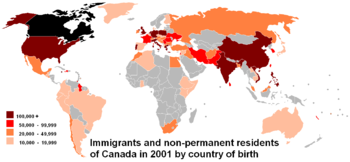With Canada’s much-anticipated
Express Entry immigration selection system due to begin on January 1, 2015, we continue to learn more about how exactly it will operate. Many questions have been answered over the past few weeks, and we’re now in a position to share this information with you.
What we have known for some time is that Express Entry will function as a two-step process. Step one will involve candidates making an expression of interest in immigrating to Canada, with candidates who are eligible for one of the federal economic immigration programs entering the Express Entry pool. Step two will involve a portion of those candidates in the pool being issued invitations to apply for Canadian permanent residence. We invite you to read the
CanadaVisa Express Entry page and
comprehensive FAQ sheet, as well as watch
CanadaVisa’s exclusive Express Entry video, in order to become familiar with how each of these steps will operate.
There will be no eligible occupations list
Whereas the current criteria for the
Federal Skilled Worker Program includes a list of 50 eligible occupations, Citizenship and Immigration Canada (CIC) has confirmed that, as of January 1, 2015, eligibility for the program will not include a list of eligible occupations. Instead, candidates will have to demonstrate that they have worked at least one year in a skilled occupation within the past 10 years. Jobs in Canada are classified by what are called National Occupational Classification (NOC) codes, which are divided by skill level and skill type.
Similarly, the current list of ineligible occupations under the
Canadian Experience Class (CEC) will not be in place under Express Entry.
All eligible applicants enter the same pool
The Express Entry pool will include candidates who are each eligible for at least one of Canada’s economic immigration programs, namely the
Federal Skilled Worker Program, the
Federal Skilled Trades Program, and the
Canadian Experience Class. It has been confirmed that, once eligibility for one of these programs has been confirmed, all eligible candidates will enter the same pool. There will not be separate pools for specific programs.
Express Entry is a fully electronic system
It has been confirmed that the entire Express Entry process, including steps one and two, will be conducted online.
Details of the Comprehensive Ranking System
The
Comprehensive Ranking System is the government of Canada’s internal mechanism for ranking candidates based on their human capital, determined by factors such as age, level of education, language ability, work experience, and whether the candidate has received a job offer from a Canadian employer or a provincial nomination. This helps CIC to decide which candidates may be issued invitations to apply for permanent residence.
Details of the ranking system were disclosed recently. There will be up to 500 points available for a candidate’s core human capital (candidates with an accompanying spouse or common-law partner may be awarded up to 460 points for their own core human capital, with a further 40 points available for the core human capital of the spouse or common-law partner), as well as 100 points for skills transferability based on specific combinations of a candidate’s core human capital. An additional 600 points will be awarded to candidates with a confirmed job offer (i.e. having received a positive
Labour Market Impact Assessment) in a skilled occupation or a nomination from a Canadian province or territory.
For full details and a complete overview of the Comprehensive Ranking System,
please see this CanadaVisa page. Once you have reviewed the system, we invite you to use the new CanadaVisa
Comprehensive Ranking Score Calculator. In just a couple of minutes this valuable tool will let you know your score, which will assist you in your preparation for Express Entry.
Language testing will be required before going into the Express Entry pool
CIC has confirmed that candidates will have to demonstrate proficiency in an official language of Canada, either English or French, in order to enter the Express Entry pool. Language ability is determined by the candidate sitting a standardised language test, the most common of which are the
IELTS or CELPIP for English and
TEF for French. Candidates will not be able to enter the Express Entry pool without submitting language test results that meet the eligibility requirements for one of the federal economic immigration programs.
An Educational Credential Assessment (ECA) will be required going into the pool for candidates eligible for the Federal Skilled Worker Program
Candidates eligible to enter the Express Entry pool under the Federal Skilled Worker Program (FSWP) must get an Educational Credential Assessment (ECA) of their completed foreign educational credentials before making an expression of interest in immigrating to Canada. It was previously unknown whether an ECA would be required for step one, but it has now been confirmed that an ECA will be required from the outset in order for a candidate to prove eligibility for the FSWP and enter the Express Entry pool.
Candidates can update their profiles while in the Express Entry pool
One of the most beneficial recent pieces of news for potential candidates is that their profiles in the pool will not be “locked”. On the contrary, candidates will be able to maneuver within the
Comprehensive Ranking System if they gain additional points, which they may do by, among other things: improving language test results, proving ability in a second official language, completing a diploma, or gaining additional work experience. We invite you to use the new CanadaVisa
Comprehensive Ranking Score Calculator. In just a couple of minutes this valuable tool will let you know your score, which will assist you in your preparation for Express Entry.
Penalties of up to five years for misrepresentation
The
government of Canada has recently introduced new measures that aim to ensure the integrity of its immigration programs and processes. Among these measures are more severe penalties for misrepresentation than were previously in place, with the penalty for misrepresentation increasing from a two- to a five-year period of inadmissibility, as well as a five-year ban on applying for permanent resident status. Candidates who are found to have given false information during any stage of the Express Entry process, including step one, will be subject to these new penalties.
The first draw from the Express Entry pool is scheduled to take place before the end of January, 2015
CIC recently stated its intention to perform the first draw (i.e. issue the first invitations to apply) before the end of January, 2015. This is likely to benefit candidates who have prepared in advance, sat language tests, and gathered supporting documents, as they are the candidates most likely to be in a position to accept an invitation to apply, if offered one.
From the date that an invitation to apply is received, applicants will have only 60 days to file a complete application
CIC has confirmed that once an invitation to apply has been issued to a candidate, he or she will have only 60 days to file a complete application and all supporting documents. No extensions will be granted. Given this limited timeframe, applicants are encouraged to gather these documents in advance. Moreover, when taking the penalties for misrepresentation into account, it is important that the information provided and documents submitted are completely accurate. Candidates may engage the services of a Canadian immigration lawyer in order to assist in preparing a complete and accurate application.
If an applicant accepts an invitation to apply, but fails to submit a complete application and all supporting documents, the applicant will not have a second opportunity to file the an application under the same invitation to apply
If an invitation to apply is issued but the applicant subsequently submits an incomplete application or fails to submit an application, the applicant will not have a second opportunity to submit the application for permanent residence under the same invitation to apply. In addition, his or her expression of interest ceases to be valid regardless of the portion of the one-year period that remains and, as a result, he or she will no longer be in the Express Entry pool. This stresses the importance of preparation on the part of the applicant.
If a candidate declines an invitation to apply, he or she will re-enter the Express Entry pool until 12 months have passed since he or she was deemed eligible to enter the pool
Certain candidates, upon receiving an invitation to apply, may feel that they are not prepared to submit a complete application and all supporting documents within the 60-day timeframe set by CIC. As such, they may decline the invitation. If an applicant declines the invitation within the 60-day period, the remaining portion of the original one-year period of their inclusion in the Express Entry pool of candidates continues to apply. Candidate, however, should be aware that there is no guarantee of being issued a second (or third, etc.) invitation to apply. Potential candidates are encouraged to prepare well in advance so that they may be in a position to accept an invitation to apply, in the event that one is offered, and submit a complete application and all supporting documents within 60 days.
Candidates will know their Comprehensive Ranking System points total and what the points threshold was for the most recent draw, but will not know their specific ranking
Candidates in the pool will be able to see their points total under the
Comprehensive Ranking System, but there will be no concrete pass mark to trigger an invitation to apply for permanent residence. The points total that a candidate may need in order to receive an invitation to apply can change fluidly as other candidates enter and leave the pool. CIC has confirmed, however, that candidates will be able to know the points that were required in order to receive an invitation to apply for the most recent draw from the Express Entry pool.
Provincial Nominee Programs will continue to exist outside the Express Entry system, but provinces will also be able to select a portion of candidates from the Express Entry pool
As has been the case in recent years, Canadian provinces and territories will continue to be able to craft their own immigration programs based on provincial labour market needs. These are known as the
Provincial Nominee Programs (PNPs). Indeed, the federal government’s
Immigration Plan for 2015, announced last month, gives a greater allocation to the PNPs than has been the case in recent years.
We have known for some time that provinces and territories will also be able to select a portion of their PNPs from the Express Entry pool. What we can additionally confirm at this stage is that applicants with a provincial nomination certificate who also qualify in one of the federal economic immigration programs may enter the Express Entry pool and, having been awarded an additional 600 points under the Comprehensive Ranking System as a result of the provincial nomination, be invited to apply for permanent residence.
Quebec applications will not be conducted through Express Entry, except where the applicant will be working outside Quebec for a Quebec-based company
Under the Canada-Quebec Accord of 1991, Quebec chooses its own immigrants and sets eligibility criteria that are separate from the criteria set by the federal government. Because of this arrangement, Quebec will not actively participate in the Express Entry system for Canadian immigration. Instead, Quebec is scheduled to reopen its
skilled worker stream and
experience program in April, 2015. Candidates applying for one of these programs must have the intention to reside in Quebec.
We recently learned, however, that candidates who indicate that they intend to live and work outside Quebec but have a job offer from a company based in Quebec will be able to participate in the Express Entry system. An example of this would be a company whose main headquarters and operations are based in Quebec, but who also have an office in another Canadian city.
The territory of Nunavut will also not participate under the Express Entry system. The two other territories and nine other provinces (i.e. all provinces except Quebec) have indicated that they will participate in the federal Express Entry system.
The revised Canada Job Bank will be ready on January 1, but job matching with Canadian employers will not
Candidates who don’t have a confirmed job offer in a skilled occupation or a provincial nomination going into the pool will be required to register on Canada’s updated Job Bank, which is expected to be ready for this purpose when Express Entry launches on January 1, 2015.
One of the main differences between the Express Entry system, compared with current and previous Canadian immigration systems, is that Canadian employers will play a greater role in the process. Under Express Entry, Canadian employers are scheduled to be able to identify candidates in the Express Entry pool and submit job offers to them. In communications throughout this year, CIC has likened the role of Express Entry in connecting skilled candidates with Canadian employers as ‘matchmaking’.
It has recently been confirmed, however, that the job matching facility in Express Entry is highly unlikely to be fully operational when the system launches on January 1, 2015. For candidates who don’t have a job offer, this may serve as an incentive to prepare an application early. Moreover, candidates can
join the CanadaVisa portal, where they can promote themselves and connect with employers.
The ages of dependent children will be determined only at the date the application for permanent residence is received, not at the date of entry to the pool
As is the case under existing immigration programs, successful applicants are entitled to bring their spouse or common-law partner, as well as dependent children, to Canada, once requisite medical and criminal background checks have been made. For the purposes of Canadian immigration, dependent children are defined as biological or adopted children under the age of 19.
It was previously unknown whether the ages of dependent children would be determined when the candidate enters the Express Entry pool, or when the invitation to apply for permanent residence has been issued, or when the application has been submitted. CIC has since confirmed that the ages of dependent children will be determined only at the date the application for permanent residence is received.
The government of Canada aims to attract 181,000 new immigrants through economic immigration programs in 2015
The Canadian government’s
immigration plan stated that the government aims to attract up to 285,000 new immigrants in 2015, around 181,000 of which are scheduled to be economic migrants (i.e. not under
family sponsorship or refugee/humanitarian cases). The majority of these economic migrants are expected to immigrate to Canada under the Express Entry system and, while the government has indicated an allocation for each economic program, the specific number of invitations to apply that may be issued under each of the economic immigration programs may be flexible.
Candidates may hire an immigration lawyer
CIC has confirmed that candidates may hire an immigration lawyer or consultant registered with the Immigration Consultants of Canada Regulatory Council (ICCRC) to represent them throughout the Express Entry process.
The reaction
“As we get closer to launch day, we’re receiving more information about how Express Entry will operate. Some of this new information is relatively minor in the greater scheme of things, but some of the new information appears to be highly significant for candidates,” says Attorney David Cohen. “For example, details of the Comprehensive Ranking System paint a clearer picture of how candidates will be assessed once they have entered the pool. It shows just how valuable a skilled job offer or provincial nomination will be. My team and I are proud to launch our free Comprehensive Ranking Score Calculator, which will assist candidates in preparing for the Express Entry system.
“It has also been confirmed that the government’s job matching facility will not be in place when Express Entry is launched. It remains to be seen how this will affect the early stages of the system.”
To find out if you are eligible for any of over 60 Canadian immigration programs, including the federal economic programs that will be conducted under Express Entry, please fill out a free online assessment today.
Source: http://www.cicnews.com/2014/12/express-entry-124159.html





























